An official website of the United States government Here’s how you know
- Translated Resources |
- Service Centers |
- Local Dashboard
Farmers.gov is not optimized for this browser. Please use the latest versions of Chrome, Edge, or Safari for the best experience. Dismiss
Find your state/county's agriculture data and USDA resources on your farmers.gov Local Dashboard !

How to Start a Farm: Plan Your Operation
Think about your operation from the ground up and start planning for your business. A good farm business plan is your roadmap to start-up, profitability, and growth, and provides the foundation for your conversation with USDA about how our programs can complement your operation.
Keep reading about planning your business below, get an overview of the beginning farmer's journey , or jump to a different section of the farmer's journey.
On This Page
Why you need a farm business plan.
A comprehensive business plan is an important first step for any size business, no matter how simple or complex. You should create a strong business plan because it:
- Will help you get organized . It will help you to remember all of the details and make sure you are taking all of the necessary steps.
- Will act as your guide . It will help you to think carefully about why you want to farm or ranch and what you want to achieve in the future. Over time, you can look back at your business plan and determine whether you are achieving your goals.
- Is required to get a loan . In order to get an FSA loan, a guarantee on a loan made by a commercial lender, or a land contract, you need to create a detailed business plan . Lenders look closely at business plans to determine if you can afford to repay the loan.
How USDA Can Help
Whether you need a good get-started guide, have a plan that you would like to verify, or have a plan you’re looking to update for your next growth phase, USDA can help connect you to resources to help your decisions.
Your state's beginning farmer and rancher coordinator can connect you to local resources in your community to help you establish a successful business plan. Reach out to your state's coordinator for one-on-one technical assistance and guidance. They can also connect you with organizations that specifically serve beginning farmers and ranchers.
It is important to know that no single solution fits everyone, and you should research, seek guidance, and make the best decision for your operation according to your own individual priorities.
Build a Farm Business Plan
There are many different styles of business plans. Some are written documents; others may be a set of worksheets that you complete. No matter what format you choose, several key aspects of your operation are important to consider.
Use the guidelines below to draft your business plan. Answering these kinds of questions in detail will help you create and develop your final business plan. Once you have a business plan for your operation, prepare for your visit to a USDA service center. During your visit, we can help you with the necessary steps to register your business and get access to key USDA programs.
Business History
Are you starting a new farm or ranch, or are you already in business? If you are already in business:
- What products do you produce?
- What is the size of your operation?
- What agricultural production and financial management training or experience do you, your family members, or your business partners have?
- How long have you been in business?
Mission, Vision, and Goals
This is your business. Defining your mission, vision and goals is crucial to the success of your business. These questions will help provide a basis for developing other aspects of your business plan.
- What values are important to you and the operation as a whole?
- What short- and long-term goals do you have for your operation?
- How do you plan to start, expand, or change your operation?
- What plans do you have to make your operation efficient or more profitable ?
- What type of farm or ranch model (conventional, sustainable, organic, or alternative agricultural practices) do you plan to use?
Organization and Management
Starting your own business is no small feat. You will need to determine how your business will be structured and organized, and who will manage (or help manage) your business. You will need to be able to convey this to others who are involved as well.
- What is the legal structure of your business? Will it be a sole proprietorship, partnership, corporation, trust, limited liability company, or other type of entity?
- What help will you need in operating and managing your farm or ranch?
- What other resources, such as a mentor or community-based organization , do you plan to use?
Marketing is a valuable tool for businesses. It can help your businesses increase brand awareness, engagement and sales. It is important to narrow down your target audience and think about what you are providing that others cannot.
- What are you going to produce ?
- Who is your target consumer ?
- Is there demand for what you are planning to produce?
- What is the cost of production?
- How much will you sell it for and when do you expect to see profit ?
- How will you get your product to consumers ? What are the transportation costs and requirements?
- How will you market your products?
- Do you know the relevant federal, state, and local food safety regulations? What licensing do you need for your operation?
Today there are many types of land, tools, and resources to choose from. You will need to think about what you currently have and what you will need to obtain to achieve your goals.
- What resources do you have or will you need for your business?
- Do you already have access to farmland ? If not, do you plan to lease, rent, or purchase land?
- What equipment do you need?
- Is the equipment and real estate that you own or rent adequate to conduct your operation? If not, how do you plan to address those needs?
- Will you be implementing any conservation practices to sustain your operation?
- What types of workers will you need to operate the farm?
- What additional resources do you need?
Now that you have an idea of what you are going to provide and what you will need to run your operation you will need to consider the finances of your operation.
- How will you finance the business?
- What are your current assets (property or investments you own) and liabilities (debts, loans, or payments you owe)?
- Will the income you generate be sufficient to pay your operating expenses, living expenses, and loan payments?
- What other sources of income are available to supplement your business income?
- What business expenses will you incur?
- What family living expenses do you pay?
- What are some potential risks or challenges you foresee for your operation? How will you manage those risks?
- How will you measure the success of your business?
Farm Business Plan Worksheets
The Farm Business Plan Balance Sheet can help gather information for the financial and operational aspects of your plan.
Form FSA-2037 is a template that gathers information on your assets and liabilities like farm equipment, vehicles and existing loans.
- FSA-2037 - Farm Business Plan - Balance Sheet
- FSA-2037 Instructions
Planning for Conservation and Risk Management
Another key tool is a conservation plan, which determines how you want to improve the health of your land. A conservation plan can help you lay out your plan to address resource needs, costs and schedules.
USDA’s Natural Resources Conservation Service (NRCS) staff are available at your local USDA Service Center to help you develop a conservation plan for your land based on your goals. NRCS staff can also help you explore conservation programs and initiatives, such as the Environmental Quality Incentives Program (EQIP) .
Conservation in Agriculture
Crop insurance, whole farm revenue protection and other resources can help you prepare for unforeseen challenges like natural disasters.
Disaster Recovery
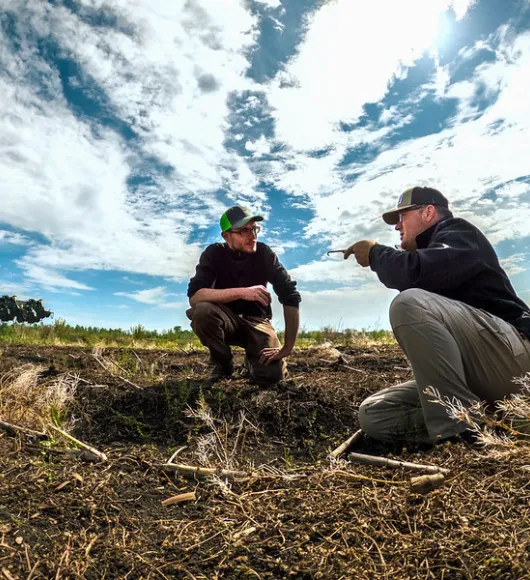
Special Considerations
Special considerations for businesses.
There are different types of farm businesses each with their own unique considerations. Determine what applies to your operation.
- Organic Farming has unique considerations. Learn about organic agriculture , organic certification , and the Organic Certification Cost Share Program to see if an organic business is an option for you. NRCS also has resources for organic producers and offers assistance to develop a conservation plan.
- Urban Farming has special opportunities and restrictions. Learn how USDA can help farmers in urban spaces .
- Value-Added Products . The Agricultural Marketing Resource Center (AgMRC) is a national virtual resource center for value-added agricultural groups.
- Cooperative. If you are interested in starting a cooperative, USDA’s Rural Development Agency (RD) has helpful resources to help you begin .
Special Considerations for Individuals
Historically Underserved Farmers and Ranchers: We offer help for the unique concerns of producers who meet the USDA definition of "historically underserved," which includes farmers who are:
- socially disadvantaged
- limited resource
- military veterans
Women: Learn about specific incentives, priorities, and set asides for women in agriculture within USDA programs.
Heirs' Property Landowners: If you inherited land without a clear title or documented legal ownership, learn how USDA can help Heirs’ Property Landowners gain access to a variety of programs and services
Business Planning
Creating a good business plan takes time and effort. The following are some key resources for planning your business.
- Farm Answers from the University of Minnesota features a library of how-to resources and guidance, a directory of beginning farmer training programs, and other sources of information in agriculture. The library includes business planning guides such as a Guide to Developing a Business Plan for Farms and Rural Businesses and an Example Business Plan .
- The Small Business Administration (SBA) offers information about starting, managing, and transitioning a business.
SCORE is a nonprofit organization with a network of volunteers who have experience in running and managing businesses. The Score Mentorship Program partners with USDA to provide:
- Free, local support and resources, including business planning help, financial guidance, growth strategies.
- Mentorship through one-on-one business coaching -- in-person, online, and by phone.
- Training from subject matter experts with agribusiness experience.
- Online resources and step-by-step outlines for business strategies.
- Learn more about the program through the Score FAQ .
Training Opportunities
Attend field days, workshops, courses, or formal education programs to build necessary skills to ensure you can successfully produce your selected farm products and/or services. Many local and regional agricultural organizations, including USDA and Cooperative Extension, offer training to beginning farmers.
- Cooperative Extension offices address common issues faced by agricultural producers, and conduct workshops and educational events for the agricultural community.
- extension.org is an online community for the Cooperative Extension program where you can find publications and ask experts for advice.
Now that you have a basic plan for your farm operation, prepare for your visit to a USDA service center.
2. Visit Your USDA Service Center
How to Start a Farm with USDA
Get an overview of the beginning farmer's journey or jump to a specific page below.
Find Your Local Service Center
USDA Service Centers are locations where you can connect with Farm Service Agency, Natural Resources Conservation Service, or Rural Development employees for your business needs. Enter your state and county below to find your local service center and agency offices. If this locator does not work in your browser, please visit offices.usda.gov.
Learn more about our Urban Service Centers . Visit the Risk Management Agency website to find a regional or compliance office or to find an insurance agent near you.

12: Business Plans
What is a business plan.
A business plan is a document that helps you to organize and succinctly summarize the vision you have for your business. The plan contains the operational and financial objectives of a business, the detailed plans and budgets showing how the objectives are to be realized.
A good business plan will contain the following:
- Your business vision, mission statement, key values, and goals
- Description of the product(s) you intend to produce
- Strengths, Weaknesses, Opportunities and Threats the business may experience are described
- Production plans
- Marketing plans
- Estimated start-up costs
- Information on your legal structure and management team
- Current financial statements or projected financial statements.
- Resume or brief explanation of your background and relevant experience
- Less than 10 total pages so that people actually read it
Helpful Publications for Writing a Business Plan
General Business Resource Publications:
- Starting an Ag-Business? A Pre-Planning Guide http://publications.dyson.cornell.edu/outreach/extensionpdf/2004/Cornell_AEM_eb0408.pdf
- Business Transfer Guide: Junior Generation http://publications.dyson.cornell.edu/outreach/extensionpdf/2016/Cornell-Dyson-eb1605.pdf
- Producing a Business Plan for Value-Added Agriculture http://publications.dyson.cornell.edu/outreach/extensionpdf/2007/Cornell_AEM_eb0708.pdf
- Business Planning for the Agriculture Sector: A Guide to Business Plan Development for Start-up to Mid-size Operations http://publications.dyson.cornell.edu/outreach/extensionpdf/2010/Cornell_ pdf
- Building a Sustainable Business (Sustainable Agricultural Research Education (SARE)Publications) sare.org/publications/business.htm 280 pages of education and practical exercises to guide you through the financial, management, and interpersonal skills needed to start a successful farm business. Order hard copy for $17 or download PDF online for free.
Cornell Cooperative Extension Publications for Specific Commodities:
- Landscape Business Planning Guide http://publications.dyson.cornell.edu/outreach/extensionpdf/2003/Cornell_AEM_eb0313.pdf
- Writing a Business Plan: A Guide for Small Premium Wineries http://publications.dyson.cornell.edu/outreach/extensionpdf/2002/Cornell_AEM_eb0206.pdf
- Writing a Business Plan: An Example for a Small Premium Winery https://ageconsearch.umn.edu/bitstream/122203/2/Cornell_AEM_eb0207.pdf

Getting Help Writing a Business Plan
- Español ( Spanish )

Apply MyCAS
- In the News
- Upcoming Events
- Online Classes
- Agricultural Tourism
- Beginning Farmers
- Dry Farming
- Olive Research for Oregon
- Whole Farm Management
- Start Your Business Plan
- Refine Your Business Plan
- Business Planning Resources
Sample Business Plans
- Berries & Grapes
- Biodiversity & Pest Management
- Harvest & Handling
- Herbs & Flowers
- Nursery Crops & Greenhouses
- Tree Fruits & Nuts
- Winter Farming
- Disaster Relief and Resiliency Programs
- Dry Farming Research
- Community Support Agriculture
- Farmers' Markets
- Marketing Your Farm
- Meat & Eggs
- Raw Agricultural Products
- Value Added
- Organic Fertilizer and Cover Crop Calculators
- Hay Production
- Irrigation & Fencing
- Mud & Manure Management
- Nutrient Management
- Pasture and Grazing Management
- Weeds, Poisonous Plants, & Other Pests
- Soil Testing
- Soil Surveys
- Improving Soil Quality & Cover Crops
- Agricultural Composting and Water Quality
- Water & Irrigation
- Business Planning

Below are examples of different farm business plans and a loan application:
Oregon Flower Farm Business Plan Example
Interval Farm Business Plan Sample
Peach Farm Business Plan Sample
USDA FSA Sample Microloan Application

Small Farm Business Plan

Starting up a business is something a person would often dream of doing. Being independent and working hours you choose for yourself. But like any other business whether it is a small one or a large one, you always need a plan to make sure it runs smoothly. Businesses without plans are a risk. The reason for having a plan would be explained below. Check the article out, 5+ small farm business plan examples in PDF.
5+ Small Farm Business Plan Examples
1. basic small farm business plan.
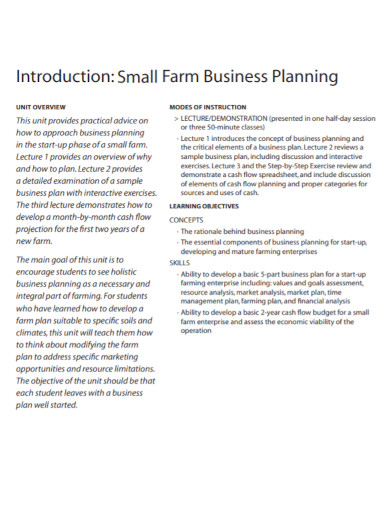
Size: 784 KB
2. Small Horticulture Farm Business Plan
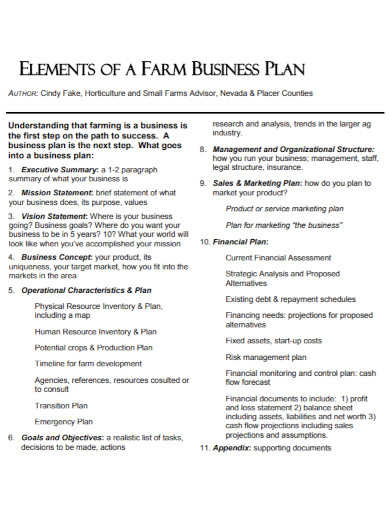
Size: 566 KB
3. Community Small Farm Business Plan
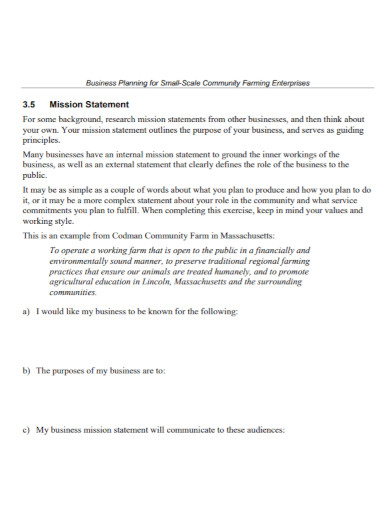
Size: 204 KB
4. Start–up Small Farm Business Plan
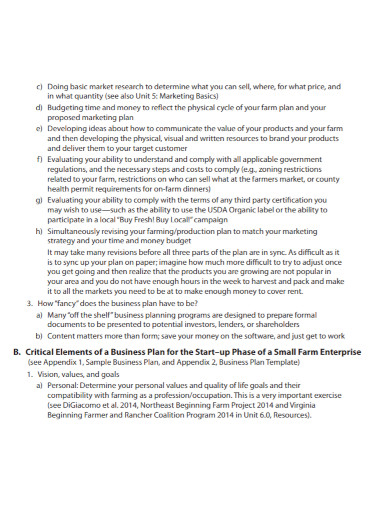
Size: 476 KB
5. Small Farm Business Plan Template
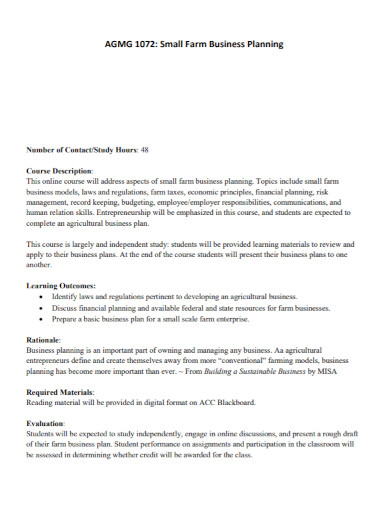
Size: 189 KB
6. Small Farm Business Evaluation Plan
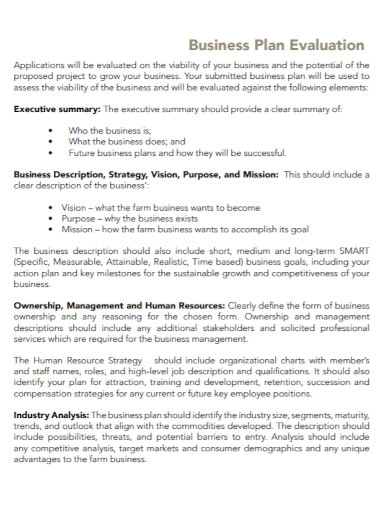
Size: 516 KB
Definition of Farm Business
A farm business or an agricultural business is an enterprise that engages in the production, processing, distribution and oftentimes exporting of products. This type of business often provides or sells crops or livestock to grocery stores or to direct distributors. The primary purpose of this business is to provide goods and services to the enterprise. Farm businesses are what some people would say highly profitable. Highly profitable if done right.
Definition of Business Plan
To define the terms business and plan in one meaning, this means a well written document that describes in full length detail on how a business works. A business plan defines the objectives, the vision and mission statement, the step by step details on how you are going to achieve your business objectives. It is a written roadmap for business people. A guide to help them attain the business and to let it run smoothly.
Importance of Business Plans
Why is it important to write a business plan? To succeed in any type of business, you would need a plan. Your business plan is your tool to help you focus on the necessary steps. These steps would help you focus, understand your ideas and to achieve them. Business plans are your road maps. They take you where you should be and how you get there is entirely up to how well you made your plan work.
Information Seen in a Business Plan
Business plans differ from the people to the companies that use them. Other business plans may have the same as the common business plans and others do not. The most common information that you would see are the following listed below .
- Vision and Mission Statements
- Introduction
- Step-by-step instructions
- Financial Goal
Tips for Making a Good Small Farm Business Plan
Let’s move on to some tips . Before you set out to want a business like this, let’s check out how to make a good business plan. As we all know a good business starts with a good business plan. To do that, we need to make one.
- Start with an overview- Give a name to your business plan. Start with how you think your business should look like and what should be added to it.
- Write your vision statement and mission statement- Your vision and mission statement must go together. Your vision statement should reflect on what you want your business to be and how it would turn out.
- State three to five goals you want to accomplish- Your goals are like your objectives. State realistic goals you want to accomplish. This also allows you to focus on what you really want to see when you start the business.
- Write a brief introduction- Your introduction should be about your business. Avoid writing information not related to your plan and lifelong goals for your business.
- State your step by step guidelines- your guidelines must be career driven and if possible from experiences you have done. Your step by step guidelines must be easy to follow and realistic.
- Set a deadline- Your deadline should also be possible. You can always start with short term deadlines and go from there.
What is a small farm business?
A farm business also called an agricultural business is a type of business wherein you produce, sell and distribute crops and livestock to companies or individuals. These types of businesses are almost always independent businesses.
Why do I need a business plan?
Business plans help entrepreneurs and other business owners to make their business decisions. It is also a tool to help you set out your goals and help you achieve them. Businesses without any plans are at risk of falling and a lot of financial ruin.
How long is a business plan?
Your business plan does not have to be pages long. Even a page long is still considered a plan. As long as the necessary information is found.
No matter how small or large your business may be, a business plan is always a good key to keeping it afloat. Businesses that have no plans for the future are at a disadvantage. It is riskier without having any, but it is also a risk when you do. But the risk is less when you plan ahead.
Text prompt
- Instructive
- Professional
Create a study plan for final exams in high school
Develop a project timeline for a middle school science fair.

IMAGES
VIDEO
COMMENTS
The library includes business planning guides such as a Guide to Developing a Business Plan for Farms and Rural Businesses and an Example Business Plan. The Small Business Administration (SBA) offers information about starting, managing, and transitioning a business.
Example Beginning Farmer Business Plan The goal of this document is to serve as a sample business plan for an early stage farm business. In this example, the farmers are preparing to finance a new farm purchase.
A farming business can be more successful if you will develop a farm business plan. Not only will you set the steps that you need to follow to achieve your goals, but you can also become more prepared with the risks.
What is a Business Plan? A business plan is a document that helps you to organize and succinctly summarize the vision you have for your business. The plan contains the operational and financial objectives of a business, the detailed plans and budgets showing how the objectives are to be realized. A good business plan will contain the following:
Below are examples of different farm business plans and a loan application: Oregon Flower Farm Business Plan Example. Interval Farm Business Plan Sample. Peach Farm Business Plan Sample. USDA FSA Sample Microloan Application
Businesses without plans are a risk. The reason for having a plan would be explained below. Check the article out, 5+ small farm business plan examples in PDF. 1. Basic Small Farm Business Plan. casfs.ucsc.edu. Details. File Format. Size: 784 KB. Download. 2. Small Horticulture Farm Business Plan. ucanr.edu. Details. File Format. Size: 566 KB.